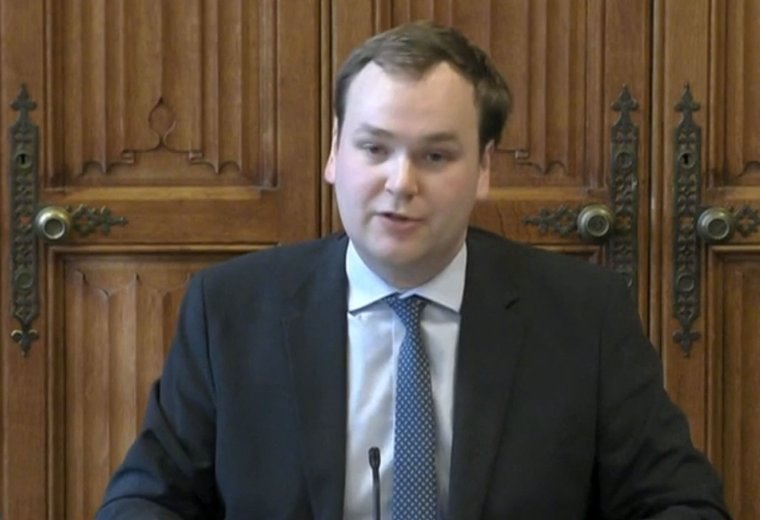William Wragg is at the centre of a honeytrap sexting scandal, after admitting giving out the personal phone numbers of colleagues to a person he met on a dating app.
The Conservative MP told The Times he handed over the information after feeling pressured by an anonymous individual who he had previously sent intimate pictures of himself to.
Police are now investigating following reports that explicit images and flirtatious messages were subsequently sent to MPs as part what has been described as a “spear phishing” scam.
Who is William Wragg?
William Wragg, 36, has represented the Greater Manchester constituency of Hazel Grove since 2015.
Following a career in teaching and as a local councillor, he was elected with 41.4 per cent of the vote and a majority of 6,552, retaining the seat in 2017 and 2019.
Mr Wragg came to national prominence in 2022, when he accused the then prime minister, Boris Johnson, of blackmailing MPs who called for a no-confidence vote in him amid the “Partygate” scandal.

In his role as chair of the Public Administration and Constitutional Affairs Select Committee, Mr Wragg publicly confirmed he had submitted a letter of no confidence in Mr Johnson.
The Metropolitan Police later met with Mr Wragg, who is a vice-chairman of the backbench 1922 Committee, to discuss the blackmail allegations.
In November 2022, Mr Wragg announced he would be standing down as an MP at the next general election.
What is the honeytrap sexting scandal?
Earlier this week, online news outlet Politico reported that a number of sitting and former MPs had been contacted by an unknown number detailing prior meetings with politicians in efforts to acquire personal or sensitive information.
On Thursday, Mr Wragg told The Times that he had shared the personal phone numbers of colleagues with a man he met on the gay dating app Grindr.
Mr Wragg said that he felt “scared” after exchanging “compromising” explicit pictures with the user, who repeatedly asked him to share colleagues’ contact details.
Mr Wragg told The Times: “I got chatting to a guy on an app and we exchanged pictures. We were meant to meet up for drinks, but then didn’t. Then he started asking for numbers of people. I was worried because he had stuff on me. He gave me a WhatsApp number, which doesn’t work now.”
He added: “They had compromising things on me. They wouldn’t leave me alone.”
“They would ask for people,” Mr Wragg said. “I gave them some numbers, not all of them. I told him to stop. He’s manipulated me and now I’ve hurt other people.
“I’ve hurt people by being weak. I was scared. I’m mortified. I’m so sorry that my weakness has caused other people hurt.”
Politico reported that a number of politicians had been contacted by a person who would allege that they had previously met.
The MPs received the unsolicited messages – which included details about their career and campaigns they had worked on – from two numbers calling themselves “Abi” or “Charlie”.
It is understood that two MPs responded by sending an explicit image of themselves, The Times reported.
One former MP told the BBC that he was contacted by someone called “Charlie” via WhatsApp on 11 March, who subsequently sent him an explicit image.
Twelve men told Politico that they had received near-identical messages to the one received by the ex-MP or similar messages from different numbers.
Several of the 12 were sent naked pictures.
The scandal has been described as an example of “spear phishing” – a type of cyber attack that targets specific groups.
It involves scammers pretending to be trusted senders in order to steal personal or sensitive information.
A parliamentary spokesperson said: “Parliament takes security extremely seriously and works closely with government in response to such incidents.
“We provide members and staff with tailored advice, making them aware of security risks and how to manage their digital safety.
“We are encouraging anyone affected who has concerns to contact the parliamentary security department.”
Are police investigating?
Leicestershire Police revealed that it is investigating one of the cases, which was reported last month.
The force said it had received a report of “malicious communications”, after a number of unsolicited messages were sent to a Leicestershire MP in March.
A spokesperson said: “Leicestershire Police is investigating a report of malicious communications after a number of unsolicited messages were sent to a Leicestershire MP last month.
“They were reported to police on Tuesday March 19. Inquiries are currently ongoing.”



Jimmy Carter was right about Israel